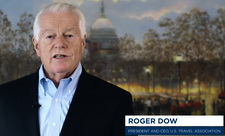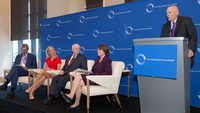The Real Estate Roundtable has elected Debra A. Cafaro (Chairman and Chief Executive Officer, Ventas, Inc.) as its new Chair for a three-year term starting July 1, 2018. She succeeds William C. Rudin (Co-Chairman and CEO, Rudin Management Company, Inc.). The Roundtable's membership also approved a 23-member Board of Directors for its 2019 fiscal year (July 1, 2018 - June 30, 2019).
 |
Left to Right: Roundtable President and CEO Jeffrey D. DeBoer; Roundtable Chair Debra A. Cafaro (Chairman and Chief Executive Officer, Ventas, Inc .); and Immediate Past Roundtable Chair William C. Rudin (Co-Chairman and CEO, Rudin Management Company, Inc .) |
The House of Representatives on June 26 voted 400-2 to pass legislation (H.R. 5841) that overhauls federal review of transactions involving foreign companies or countries, including certain real estate transactions. The Senate on June 18 passed its version of the legislation (S. 2098). (Dechert, June 2018)
 |
Both the House and Senate FIRRMA bills would expand the list of covered transactions to include some foreign purchases and leases of real estate near military and other strategic facilities. |
While the House and Senate bills are similar, the definition of “critical technology” differs and will require reconciliation before a final vote in each chamber. The Trump Administration has shown support for reforming FIRRMA to strengthen CFIUS’ oversight.
 |
|
The Real Estate Roundtable provided formal comments regarding implementation guidance for newly designated Opportunity Zone communities. |
The significant, positive role of international travel and tourism in boosting the U.S. economy, creating American jobs and helping the foreign trade imbalance was the focus of efforts by the VisitU.S. Coalition this week on Capitol Hill.
 |
A VisitU.S. coalition video with CEO testimonials was released to address the drop of 7.4 million international visitors to America from 2015-2017. Roger Dow, President and CEO of the U.S. Travel Association, above. |
 |
The economic importance of foreign travel and tourism to the United States' economy and commercial real estate industry was the focus of a panel discussion during The Roundtable's 2018 Annual Meeting this month. |
A panel discussion at The Roundtable’s June 14 Annual Meeting focused on the travel and tourism issue. Participants included USTA’s Roger Dow, AH&LA’s Katherine Lugar, Senator Amy Klobuchar (D-MN) and Anthony E. Malkin (Chairman and CEO, Empire State Realty Trust). (Roundtable Weekly, June 15, 2018.)